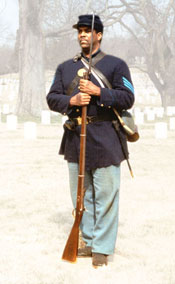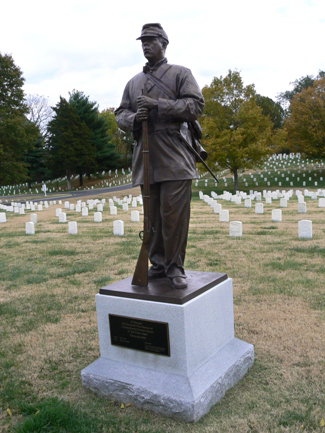
According to the Civil War News, "New Statue At Nashville Cemetery Honors USCT [United States Colored Troops] Troops," by Gregory L. Wade, on April 2006 -- NASHVILLE, Tenn. - On a brutally cold February morning, about 200 people from diverse walks of life attended the dedication of an African American infantryman statue in Nashville's National Cemetery in honor of U.S. Colored Troops buried there.
The local and national officials, reenactors, church choir members and others had one thing in common - they shivered in the unusually bitter cold to witness the recognition deservedly being given to Tennessee's Civil War soldiers of color.
Concerning the cold, State Senator Thelma Harper was heard saying, "Later we can get back to our warm cars. Those soldiers long ago had to endure much more than this for their cause."
The nine-foot cast bronze statue, created by Middle Tennessee artist Roy Butler, is one of a very few "freestanding monuments to African American soldiers in the country and the only one in a national facility," according to Norm Hill, chairman of the Tennessee Historical Commission.
The project was coordinated by the African American Cultural Alliance of Nashville. The funds for the $80,000 project came from a variety of area contributors, while the Tennessee Historical Commission contributed $15,000.
"This was a grassroots effort which included church contributions, individual citizens, businesses and other Civil War groups including the Sons of Confederate Veterans (SCV)," said Hill. "This isn't about North or South. That was then. Today this is about honoring our fallen soldiers."
He related that they went down to Shiloh National Military Park a few months earlier to help the SCV dedicate the new Tennessee Confederate monument "and they are here today to help us."
The idea for the memorial came up a few years ago during Black History Month at a Nashville university. Kwame Leo Lillard of the African American Cultural Alliance had longed for such recognition for years.

"I wanted us to never forget those men, most who fled slavery to fight and die for freedom," he told the crowd. The contribution of the USCTs to the war deserves greater visibility, especially the role of the Tennesseans in the conflict, he pointed out.
It is believed Tennessee contributed about 20,000 black troops to the Union cause during the war. More than 400 "unknown" African American troops are among some 1,500 buried in the Nashville cemetery.
Most of them came from Middle Tennessee and Kentucky battles including the Battles of Nashville and Franklin. They were reinterred from at least 251 burial sites, according to cemetery documents.
Bill Radcliff, a Nashville firefighter and reenactor with the 13th U.S. Colored Troops, served as the model for the statue. For many years Radcliff went to Fort Negley in Nashville on the anniversary date of the battle of Nashville to sit and meditate.
"After awhile others came and joined him and now an entire group goes every anniversary to reflect on what those men did," according to Patricia Floyd, Radcliff's fiancˆ©e and period reenactor herself. Because of that dedication he was chosen as the model.
"Bill would not look at the statue until it was unveiled," says Floyd. "When the covering came down we both broke down with emotion. It was quite an honor."
William Tuerk, Under Secretary for Memorial Affairs in the Department of Veterans Affairs, was keynote speaker. Also speaking were Lillard, Hill, Radcliff and Michael Crutcher as black abolitionist Frederick Douglass. In honor of Radcliff, several members of the Nashville fire department attended, including former Chief Buck Dozier.
Darlene Richardson, Historian for the National Cemetery Administration, U.S. Department of Veterans Affairs, said, "The USCT memorial at Nashville National Cemetery is a beautiful and well done tribute to the U.S. Colored Troops - a commemoration that was long overdue."
After the presentations, a short procession took the crowd across the snowy and windswept grounds to the veiled statue. Despite the cold, few left until the canvas covering was removed to reveal the likeness that will stand watch over the soldiers buried there "for at least another 100 years," said Hill.
The Nashville National Cemetery was established as a U.S. Military Cemetery in January 1867. There are 16,485 Union troops interred there and today it contains a total of 33,258 graves. The cemetery has records of 12,769 Civil War era soldiers available. (source: Civil War News)



No comments:
Post a Comment